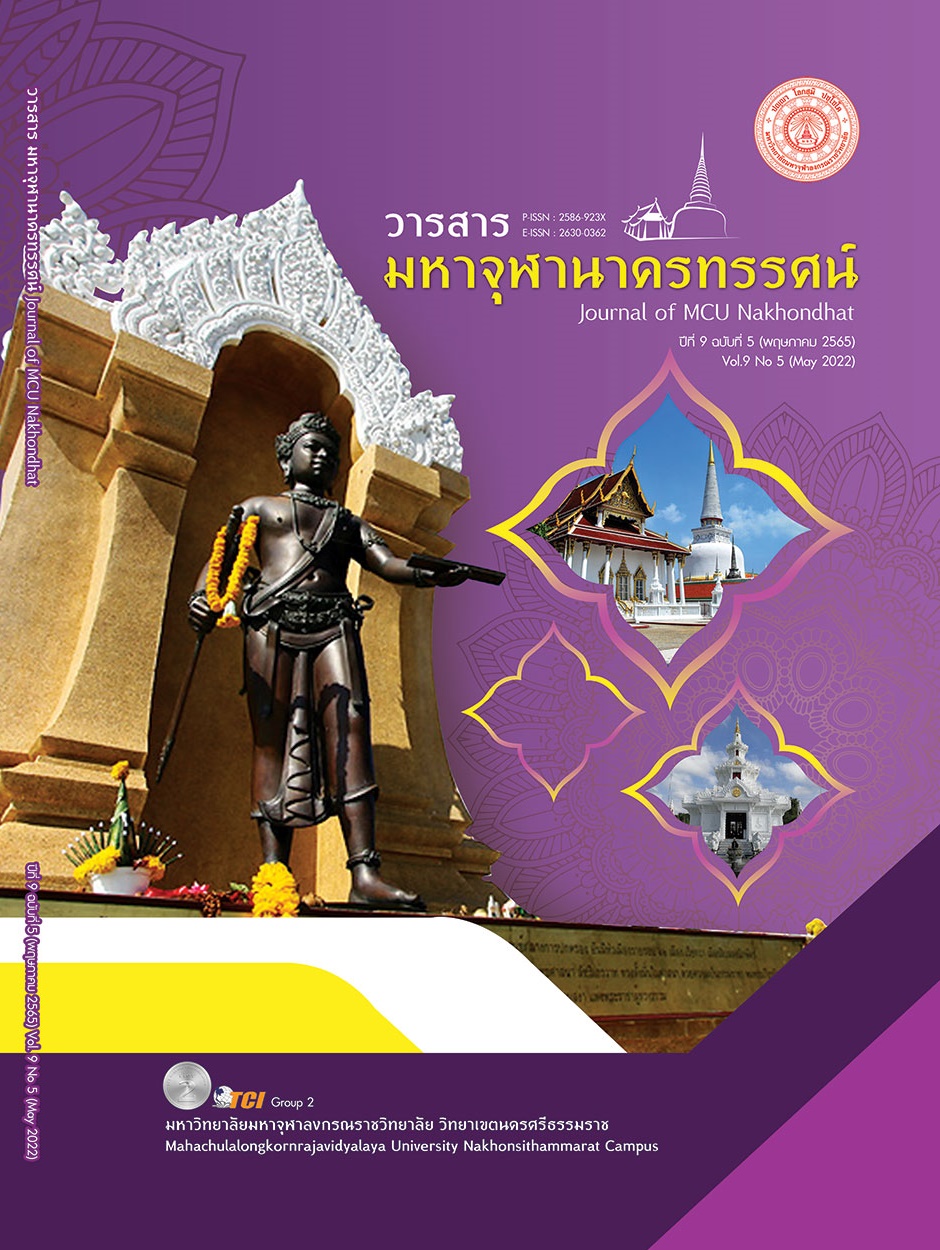LIFELONG LEARNING COMPETENCY IN DISRUPTIVE FOR SECONDARY SCHOOL TEACHERS IN SOUTHERN
Main Article Content
Abstract
The objectives of this research article were to analyze the factors of lifelong learning and building lifelong learning competency in disruptive secondary school teachers in southern Thailand using the mixed method. The research instrument was a 5-Likert rating scale questionnaire, which was used as a confirmation questionnaire on lifelong learning competency in disruptive secondary school teachers with a coefficient of .973. The samples were teachers in secondary schools by determining the sample size according to the concept of Hair, et al. the ratio of variable to sample size equal to 1:20 for 960 people with a stratified random sampling approach. The researcher analyzed the confirmation questionnaire and found that the lifelong learning factor was consistent with the empirical data (X2=7.30, df=4, p=0.12075, CFI=1.00, GFI=0.997, AGFI=0.989, RMR=0.0373, RMSEA=0.029). The results showed that the lifelong learning factor consisted of 5 factors as followed; 1) self-development for change; 2) persistence in the face of volatility; 3) conceptual framework; 4) use of technology to benefit professional development, and 5) staying up-to-date with technology in times of volatility. By building lifelong learning competency in disruptive learning for secondary school teachers, researchers have confirmed lifelong learning competency in reversals for teachers with a multi-faceted discussion meeting to find consensus using the MACR technique by 9 experts. The evaluation is characterized by a rating scale, that is, systematic evaluation, ranging from 0-100 scores to calculate the mean and the range. The results showed that lifelong learning competencies consist of 8 competencies including 1) strategic planning; 2) dynamic; 3) growth mindset; 4) learning with technology; 5) self-improvement; 6) innovation; 7) developing learning management, and 8) life skills.
Article Details

This work is licensed under a Creative Commons Attribution-NonCommercial-NoDerivatives 4.0 International License.
References
กนิน แลวงค์นิล. (2561). การพัฒนากรอบแนวคิดสมรรถนะของครูใหม่สังกัดสำนักงานเขตพื้นที่การศึกษามัธยมศึกษา เขต 2. วารสารอิเล็กทรอนิกส์ทางการศึกษา, 13(1), 400-409.
จักรี เตจ๊ะวารี. (2564). การศึกษาไทย: จุดเน้นเพื่อรับมือกับความท้าทาย. เรียกใช้เมื่อ 24 พฤศจิกายน 2564 จาก https://www.bangkokbiznews.com/columnist /973744
จุฑารัตน์ จันทร์ประคอง และคณะ. (2564). องค์ประกอบการเรียนรู้ตลอดชีวิตของนักศึกษาระดับปริญญาตรี มหาวิทยาลัยรามคำแหง. วารสารมหาจุฬานาครทรรศน์, 8(11), 244-258.
ชูกิจ ลิมปิจำนงค์. (2564). ครูยุคใหม่สู่การจัดการเรียนรู้ฐานสมรรถนะ สิ่งจำเป็นที่ต้องมี. เรียกใช้เมื่อ 15 มิถุนายน 2564 จาก https://www.ipst.ac.th/ news/12598/teacher_ipst.html
นเรศ ปู่บุตรชา. (2561). สมรรถนะครูกับคุณภาพผู้เรียนในศตวรรษที่ 2.1. วารสารมหาวิทยาลัยราชภัฏรอยเอ็ด, 12(2), 255-267.
บุญช่วย ศิริเกษ. (2560). การศึกษาวัฒนธรรมองค์การแบบสร้างสรรค์กับการเป็นองค์กรแห่งการเรียนรู้ในมหาวิทยาลัยมหามกุฏราชวิทยาลัย วิทยาเขตศรีล้านช้าง. วารสาร สมาคมนักวิจัย, 22(2), 65-80.
ศิริชัย กาญจนวาสี. (2546). ทฤษฎีการประเมิน. กรุงเทพมหานคร: เท็กซ์ แอนด์เจอร์นัล พับลิเคชั่น.
สำนักงานเลขาธิการคุรุสภา. (2562). กรอบสมรรถนะครูเอเชียตะวันออกเฉียงใต้ (ซี-ทีซีเอฟ). กรุงเทพมหานคร: บริษัทออนป้า จำกัด.
Acar, I. H. & Ucus, S. (2017). The Characteristics of Elementary School Teachers’ Lifelong-Learning Competencies : A Convergent Mixed- Methods Study. EDUCATIONAL SCIENCES: THEORY & PRACTICE, 17(6), 1833–1852.
Almenara, J. C. & Osuna, J. B. (2018). Los escenarios tecnológicos en Realidad Aumentada (RA): Posibilidades educativas. Aula Abierta, 47(3), 327-336.
Aykac, M., KÖĞCE, D. & Korkut, P. (2020). A Thematic Analysis of Theses Made in the Field of Lifelong Learning with Pre-Service Teachers (2009-2020). Journal of Educational Sciences ResearchInternational E-Journal, 10(2), 1-20.
Boomtham, T. (2017). Leadership in Digital Economy Era and Sustainable Developmentof Educational Organizations. Technical Education Journal King Mongkut’s University of Technology North Bangkok, 7(1), 218-223.
Demirel, M. & Akkoyunlu, B. (2017). Prospective teachers’ lifelong learning tendencies and information literacy self-efficacy. Educational Research and Reviews, 12(6), 329-337.
Doerr, J. (2018). Measure What Matters. New York: Penguin Random House.
Hair, J. et al. (2010). Multivariate Data Analysis (7th ed.). New Jersey: Pearson Prentice Hall.
Kahirol, M. S. et al. (2014). Competency of adult learners in learning : Application of the Iceberg Competency Model. Social and Behavioral Science, 204(2015), 326-334.
Likert R. (1967). The Human Organization: Its Management and Value. New York: McGraw-Hill.
Manarangsan, S. (2019). Thais Prepare for 6Super Disruption. Retrieved January 25, 2019, from http://www.cp-enews.com/news/details/cptalk/2898.
UNESCO. (2019). Artificial Intelligence (AI) in Education: Challenges and Opportunities For Sustainable Development. Retrieved August 6, 2021, from https://en.unesco.org/artificial intelligence/education.


